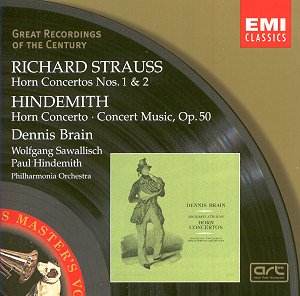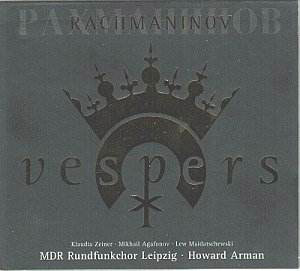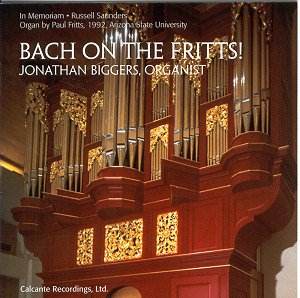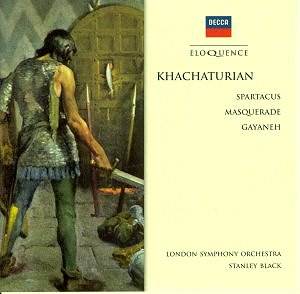 Composer: Richard Strauss, Paul Hindemith
Composer: Richard Strauss, Paul Hindemith
Works: Horn Concerto No. 1 in E♭, Op. 11; Horn Concerto No. 2 in E♭; Horn Concerto (Hindemith); Concert Music for Brass and Strings, Op. 50
Performers: Dennis Brain, horn; Philharmonia Orchestra, conducted by Wolfgang Sawallisch
Recording: Abbey Rd Studios, London, September 1956; Kingsway Hall, London, November 1956
Label: EMI Classics
Richard Strauss and Paul Hindemith represent two distinct yet complementary threads in the fabric of 20th-century classical music. Strauss, rooted in the lush tradition of late Romanticism and known for his operatic and orchestral mastery, stands in contrast to Hindemith, whose works often grapple with the complexities of modernity and emerging atonality. This recording, featuring Dennis Brain, one of the most celebrated horn players of the 20th century, provides a fascinating juxtaposition of their musical philosophies through the lens of the horn concerto, an instrument both composers held in high regard.
The two Strauss horn concertos encapsulate his evolution as a composer. The first concerto, written in his late teens, exhibits youthful exuberance and a mastery of lyrical line, while the second, composed in 1942, reflects the maturity of his late style, characterized by a more introspective and nuanced orchestration. Brain’s interpretation of both works showcases his extraordinary technical prowess, particularly in the second concerto’s finale, where he effortlessly navigates the intricate interplay between soloist and orchestra. The climactic moment, where the orchestral horns join the soloist for a jubilant restatement of the main theme, is executed with such precision and vigor that it encapsulates the spirit of camaraderie inherent in Strauss’s writing.
Hindemith’s contributions, particularly the Horn Concerto and the Concert Music for Brass and Strings, introduce a contrasting aesthetic. The horn concerto, composed in 1949, carries a rhythmic drive reminiscent of Hindemith’s Symphonic Metamorphoses, yet retains a distinctive emotive depth. The inclusion of the poem by Hindemith as a guiding principle for the final movement’s mood is an intriguing aspect, though the booklet clarifies that it was not intended to be recited. This subtlety allows for a more fluid interpretation, with Brain’s phrasing capturing the essence of the poem’s imagery without literal declamation. The Concert Music, while not featuring the horn as a solo instrument, reveals Hindemith’s orchestral brilliance, particularly in its fugal passages, which presage later works by composers such as Walton and Britten.
The recording quality is exemplary, a hallmark of the EMI Classics label. The clarity of Brain’s horn is particularly noteworthy; his tone is both smooth and vibrant, allowing for the exploration of dynamic contrasts throughout the concertos. The engineering effectively balances the horn with the orchestra, ensuring that neither overpowers the other, a feat particularly challenging in the lush orchestrations of Strauss. The spatial qualities of the recording enhance the listening experience, with a palpable sense of depth that transports the listener to the era of its conception.
This collection stands as a vital document of mid-20th century performance practice, exemplifying Brain’s artistry at its zenith. While there are other notable recordings of these works—such as those featuring soloists like Hermann Baumann or David Cooper—Brain’s interpretations remain unmatched in their combination of skill and expressiveness. His ability to convey the inherent character of both composers is a testament to his legacy.
A celebration of horn repertoire, this recording not only offers a profound insight into the works of Strauss and Hindemith but also serves as an enduring tribute to Dennis Brain’s unparalleled artistry. The disc is indispensable for both horn players and aficionados of 20th-century music, presenting a compelling auditory experience that resonates with historical significance and artistic brilliance.


